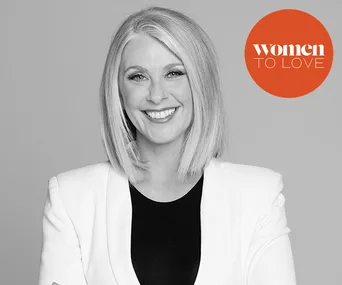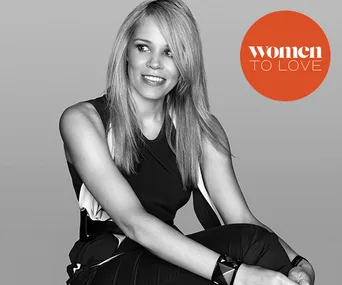Michelle Law is a writer, screenwriter, playwright and actress and she’s breaking barriers many of us didn’t even know existed. Her debut play Single Asian Female is the first Australian mainstage play to feature three Asian leads and have 80 per cent of the cast be non-anglo — somewhat of a shake-up for Australia’s very white theatre culture.
Both her play and upcoming series Homecoming Queens are semi-autobiographical and explore different aspects of her identity, like being a woman of colour or living with a chronic illness. They interlace serious struggles with side-splitting hilarity and completely overthrow the age-old trope of Asian women being meek and submissive.
We caught up with Michelle to chat about what it’s like to get alopecia as a teenager, being the only woman of colour in a screenwriter’s room and the downside of being a workaholic.
What’s been the most pivotal moment of your career?
In 2013, I did a TEDx Talk called ‘A bald woman’s guide to survival’, explaining what it was like living as a young woman with alopecia. It was a pretty confronting experience, but it launched me into writing more personal stories, like my play, Single Asian Female.
It’s the first play I’ve ever written [after writing for film and TV] and it opened in Brisbane last year. It was commissioned by Belvoir Theatre in Sydney for a second season and it’s actually being performed right now! I’ve also written a web series with my friend which is, among other things, about growing up with alopecia.
About four or five years ago, my friend [Chloë Reeson] and I left a party pretty early and we were talking about how disconnected we felt from our other friends. My alopecia had recently come back and she’d been diagnosed with breast cancer in her early 20s and we were kind of bonding over the fact we couldn’t really connect with people our age. We joked we should make a show about young women living with chronic illnesses like us. Before we knew it, the joke was serious and we created Homecoming Queens, and I actually play the part of myself.
If you could give your 13-year-old self advice, what would it be?
I’d tell myself that it’s okay to say no in all aspects of life. You don’t have to take on everything for other people — at work, in school, personal life.
I’d also stress the importance of a good work/life balance. I have workaholic tendencies and I need to remember taking breaking should be a part of your job, it’s so important to take care of yourself.
Do you have any regrets you’d change if you could do it all again?
I know this is probably so cliché, but I don’t regret anything I’ve done or any choices I’ve made. I mean, I don’t think I’m really at a stage yet where any adverse effects have come in to play yet, but every negative experience I’ve had, I’ve definitely learned from.
Every failure I’ve had has really contributed to my career. I’ve applied for countless grants and fellowships without success — a very common story for anyone in the arts. I’ve been lucky enough to receive grants and awards in the past, but that’s only because I learned from all of those previous failed applications (seeking feedback on why I failed and how I could improve) and persisting over years and years.
Online trolling has also taught be to remain resilient. When you’re a woman with an opinion, people are going to tear you down and attribute your “bad attitude” to being a “typical, sexist feminist”, which is a bit of an oxymoron. I’ve had some atrocious stuff said to me because people don’t seem to understand online abuse is still plain old abuse, and it takes time to learn how to shake that off and just trust yourself and your truth.
WATCH: Michelle’s brief cameo in one of the shows she writes for, Family Law.
In your TEDx Talk, you spoke about women’s beauty being intrinsically linked to their hair. All women feel pressure on how they look, but do you think that’s heightened in the entertainment industry?
Definitely. The more actresses I meet and get to know, the more I see the ramifications of those pressures. There are strict guidelines when it comes to hair because if they shave their head or cut their hair shorter, they’re less likely to book jobs.
Working in TV has definitely made me conscious of how much weight is put on how women look, but it’s also made me more adaptable. I’ve struggled with my alopecia in different ways throughout my life. It started when I was a teenager which obviously is an awful time for your hair to start to fall out. It’s awful being attracted to people who aren’t attracted to you, and women’s sexuality is so heavily linked with their hair and face.
As I’ve gotten older, it’s definitely gotten easier, despite moving into an industry that focuses so much on looks. I’v e learned to accept it and it’s just a part of who I am now.
How do you think the entertainment industry can adapt and change to empower women?
It comes down to people in power championing women and people of colour so they have more of a voice at the big table.
It may be controversial, but I’d love to see Australia introduce quotas to address race and gender inequality in the arts. It’s about people at the top making channels for us to show our stuff. I’d also encourage people to choose work from a diverse bag — we’re producing amazing content, we just need the chance to prove it.
Do you think women in your generation are fully behind the feminist cause or do you think it’s started to get a bad reputation?
I think younger women are woke about feminism, there’s definitely an appreciation for the movement. My issue with it is that I think feminism is often influenced by capitalism. I’m very wary of people picking and choosing when they support something, and I think that can be the case for feminism sometimes.
It’s really important to me that people don’t only support feminism when it’s trendy, that they’re true activists and get behind it even when it’s not fashionable.
Have you noticed sexist microaggressions at your work — experiences or comments people make purely because you’re a woman?
I think it depends on your identity. As a young woman of colour in writing rooms, which are still mainly men, I’ve voiced my opinions and had people look over at me like, “Oh, you’re still here?” It’s pretty disheartening, honestly — just a constant fight to be heard.
I’m getting better though. I’m starting to realise my voice has worth and people should listen to what I say.
Your career has been quite wide-spanning in terms of what you’ve worked on. Would you say you’ve had a mentor or someone helping you navigate the crazy world of the entertainment industry?
I’ve been lucky to have great support from so many people throughout my career, particularly from older women. They’ve given me heaps of opportunities to show my work.
I also found a really close collaborator in Corrie Chen. She’s like an older sister to me and has given me so much support and advice since the beginning. We have each other’s backs and it’s really great knowing you have someone there you can rely on and trust.
Cover image credits: Tammy Law.



